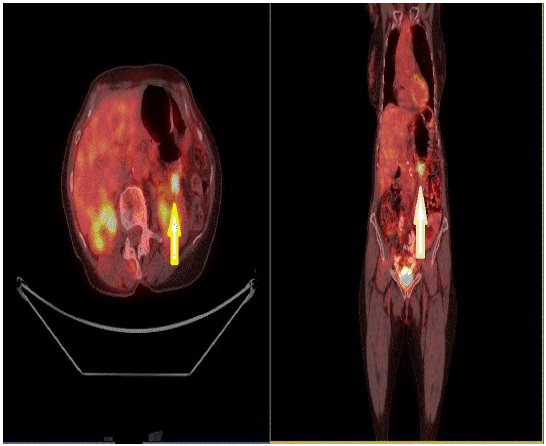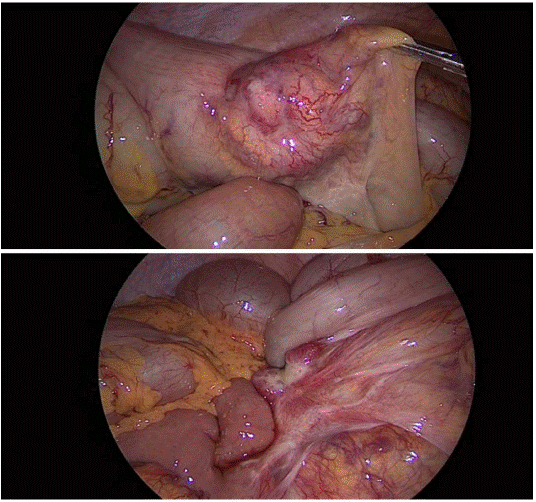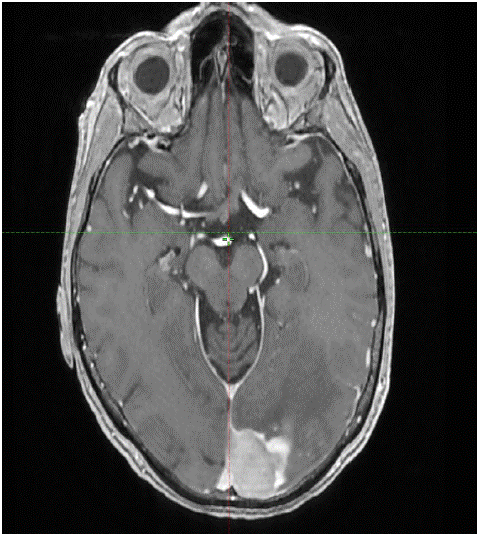
Case Report
Ann Hematol Onco. 2023; 10(1): 1419.
A Case of an Aggressive Triple Negative Metastatic Metaplastic Breast Cancer
Sedloev TA1, Usheva SS1*, Spirdonov JV2, Grozdev KS3 and Koleva4
1Department of Surgery, University Hospital “Tzaritza Joanna – ISUL”, Medical University of Sofia, Bulgaria
2Department of Medical imaging, University Hospital “Tzaritza Joanna – ISUL”, Medical University of Sofia, Bulgaria
3Department of General Surgery – MBAL “Sveta Sofia”, Sofia, Bulgaria
4Department of Medical Oncology – MBAL “Sveta Sofia”, Sofia, Bulgaria
*Corresponding author: Usheva SSDepartment of Surgery, University Hospital “Tzaritza Joanna – ISUL”, Medical University of Sofia, Str. ‘’Byalo More’’ 8, 1527 Sofia, Bulgaria
Received: January 17, 2023; Accepted: February 26, 2023; Published: March 03, 2023
Abstract
Introduction: We present a case of a 69 years old Bulgarian patient with a Triple Negative (TN) MBC. One year after the Breast-Conserving Surgery (BCS), adjuvant chemo- and radiotherapy she was diagnosed with metastases in the sigmoid colon, mesosigmoid, loco-regional lymph nodes and in the brain.
Case report: The patient was initially diagnosed with locally advanced TNBC of the left breast in March 2021. She had undergone 6 courses of neoadjuvant chemotherapy and BCS with axillary lymph node dissection on 15.07.2021. The patient had received 4 courses of CarboTAx and whole breast radiation therapy postoperatively until December 2021. Eight months after that she was diagnosed with large bowel lesion in the sigmoid and a second small one in the mesosigmoid on the follow up PET/CT. She was admitted and had undergone laparoscopic left hemicolectomy. Due to signs of central system disorder (headache, impaired vision and vertigo) she was sent to additional examination with MRI (17.10.2022). Several heterogenous formations were found in the supratentorial space.
Discussion: TNBC presents an aggressive subgroup, associated with worse prognosis and in about 30-40% of the cases early metastases and recurrence are observed. MBCs have poor response rates to cytotoxic chemotherapy compared to other types of BC.
Conclusion: The presented case is here to show the unpredictable biological behaviour of this pathology regardless of the adequate treatment plan and careful follow up and to remind the physicians to be permanently aware of the numerous manifestations of the disease.
Keywords: Triple negative metastatic metaplastic breast cancer; Chemotherapy; Chemoresistance; Colon; Brain
Introduction
Metaplastic Breast Cancer (MBC) is a rare and aggressive subtype of Breast Cancer (BC), comprising approximately 1% of all BC cases, and is defined histologically as tumors that have epithelial differentiation into squamous and/or mesenchymal components, with multiple components often co-existing in the same tumor [1,2]. We present a case of a 69 years old Bulgarian patient with a Triple Negative (TN) MBC, who received 6 courses of neoadjuvant chemotherapy, was operated afterwards and staged - T2N0M0. One year after the Breast-Conserving Surgery (BCS), adjuvant chemo- and radiotherapy she was diagnosed with metastases in the sigmoid colon, mesosigmoid, loco-regional lymph nodes and in the brain.
Case presentation
This is a case of an aggressive subtype of MBC in 69 years old Bulgarian women-TNBC with sigmoid and brain metastases. The patient was initially diagnosed with locally advanced TNBC of the left breast in March 2021. She was without any additional comorbidities and family history of breast or ovarian cancer. The multidisciplinary oncological board have decided to give her neoadjuvant chemotherapy in the following regimen: 4 courses of FEC (5-flourouracil, epirubicin, cyclophosphamide) and 2 courses of Docetaxel. She had undergone BCS with axillary lymph node dissection on 15.07.2021.
The final histopathological result verified poorly differentiated TN MBC of the left breast, G3, e-cadherin – negative, Ki67 – 70% expression with wide zones of necroses. No metastases were found in the 12 examined lymph nodes.
The patient had received 4 courses of CarboTAx and whole breast radiation therapy postoperatively until December 2021. Eight months after that she was diagnosed with large bowel lesion in the sigmoid and a second small one in the mesosigmoid on the follow up PET/CT with SUV 8 (08.2022), initially assessed as a metachronous colorectal cancer (Figure 1).

Figure 1: PET/CT incidental detection of cancer of the sigmoid colon 11 months after BCS for BC of the left breast.
She was admitted and had undergone laparoscopic left hemicolectomy (09.2022- Figure 2).

Figure 2: Intraoperative finding – a defined oval tumor in contact with the bowel’s wall and a second lesion involving and fixating the mesosigmoid.
The result from the final histopathological examination showed histological and immunohistochemical concordance between the colon and breast specimens – TN MBC with heterogenous mesenchymal differentiation with negative expression of cytokeratin and positive for p63 and AMAKR markers. The patient was scheduled to receive chemotherapy with Nab-paclitaxel but due to signs of central system disorder (headache, impaired vision and vertigo) she was sent to additional examination with MRI (17.10.2022). Several heterogenous formations were found in the supratentorial space-one occipitally on the left side (37 x 29 mm – Figure 3) and four smaller frontally and frontoparietally on the right, which were interpreted as secondary lesions. After careful consideration the patient is set to undergo CyberKnife treatment.

Figure 3: Multiparametric head MRI – an oval lesion with perifocal vasogenic edema close to the inferior sagittal sinus and left venous torcula.
Discussion
MBCs tend to present with a larger size, less frequent axillary nodal involvement, and have a higher rate of developing distant metastasis compared to other BC [3,4]. They are frequently negative for Hormone Receptors (HR) and Human Epidermal Growth Factor 2 (HER2) overexpression, with 85-89% of cases noted to be TN in recent analyses [5-7]. However, compared to other TNBC, MBCs tend to have worse outcomes across all clinical stages, with 3-year overall survival for stage IV disease of 15% vs 22% for TNBC, and 64% for all other BC types according to the National Cancer Database [8].
TNBC presents an aggressive subgroup, associated with worse prognosis and is responsible for about 15-20% of all BC cases and is becoming a great therapeutic challenge due to the absence of clearly defined molecule targets, which deprive these patients of the efficiency of conventional chemotherapy and hormonal treatment. In about 30-40% of the cases of TNBC early metastases and recurrence are observed [9-13]. In Park et al.’s research, the TNBC group showed poorer disease free survival than the HR-positive group among patients with T1a-bN0M0 BC and was identified as an independent risk factor for overall survival [14].
MBCs have poor response rates to cytotoxic chemotherapy compared to other types of BC and recent studies are aimed to evaluate the response to immune checkpoint blockade-anti-PD-1-therapy [15].
Adams reported a case of metastatic MBC with a large chest wall lesion that dramatically responded to nab-paclitaxel + pemFigure brolizumab, with an ongoing response at 6 months, whereas Al Sayed et al. (2019) presented a case of chemo-refractory metastatic MBC treated with durvalumab + paclitaxel with a complete clinical response reported without recurrence at 2 years [16,17].
Conclusion
The aggressive nature of TN metastatic MBC as a chemo resistant subtype of BC force the scientists to target different molecular alterations in need for effective palliative options. The presented case is here to show the unpredictable biological behavior of this pathology regardless of the adequate treatment plan and careful follow up and to remind the physicians to be permanently aware of the numerous manifestations of the disease.
Conflicts of Interest
The Authors have no conflicts of interest or funding to disclose.
Authors’ Contributions
All Authors contributed equally to this work, generated and edited the figures and wrote the article.
References
- Pezzi CM, Patel-Parekh L, Cole K, Franko J, Klimberg VS, et al. Characteristics and Treatment of Metaplastic Breast Cancer: Analysis of 892 Cases From the National Cancer Data Base. Ann Surg Oncol. 2007; 14: 166-173.
- Schwartz TL, Mogal H, Papageorgiou C, Veerapong J, Hsueh EC. Metaplastic Breast Cancer: Histologic Characteristics, Prognostic Factors and Systemic Treatment Strategies. Exp Hematol Oncol. 2013; 2: 31.
- Tray N, Taff J, Adams S. Therapeutic Landscape of Metaplastic Breast Cancer. Cancer Treat Rev. 2019; 79.
- Budzik MP, Patera J, Sobol M, Czerw AI, Deptala A, et al. Clinicopathological Characteristics of Metaplastic Breast Cancer - Analysis of the Basic Immunohistochemical Profile And Comparison With Other Invasive Breast Cancer Types. Breast. 2019; 43: 135-141.
- Takala S, Heikkilä P, Nevanlinna H, Blomqvist C, Mattson J. Metaplastic Carcinoma of the Breast: Prognosis and Response to Systemic Treatment in Metastatic Disease. Breast J. 2019; 25: 418-424.
- Joneja U, Vranic S, Swensen J, Feldman R, Chen W, et al. Comprehensive Profiling of Metaplastic Breast Carcinomas Reveals Frequent Overexpression of Programmed Death-Ligand 1. J Clin Pathol. 2017; 70: 255-259.
- Ross JS, Badve S, Wang K, Sheehan CE, Boguniewicz AB, et al. Genomic Profiling of Advanced-Stage, Metaplastic Breast Carcinoma by Next-Generation Sequencing Reveals Frequent, Targetable Genomic Abnormalities and Potential New Treatment Options. Arch Pathol Lab Med. 2015; 139: 642-649.
- Moreno AC, Lin YH, Bedrosian I, Shen Y, Babiera GV, et al. Outcomes After Treatment of Metaplastic Versus Other Breast Cancer Subtypes. J Cancer. 2020; 11: 1341-1350.
- Yin WJ, Lu JS, Di GH, Lin YP, Zhou LH, et al. Clinicopathological features of the triplenegative tumors in Chinese breast cancer patients. Breast Cancer Res Treat. 2009; 115: 325-333.
- Fulford LG, Reis-Filho JS, Ryder K, Jones C, Gillett C, et al. Basal-like grade III invasive ductal carcinoma of the breast: patterns of metastasis and long-term survival. Breast Cancer Res. 2007; 9: R4.
- Liedtke C, Mazouni C, Hess KR, Andre F, Tordai A, et al. Response to neoadjuvant therapy and long-term survival in patients with triple-negative breast cancer. J Clin Oncol. 2008; 26: 1275-1281.
- Lin Y, Yin W, Yan T, Zhou L, Di G, et al. Site-specific relapse pattern of the triple negative tumors in Chinese breast cancer patients. BMC Cancer. 2009; 9: 342.
- Foulkes WD, Smith IE, Reis-Filho JS. Triple-negative breast cancer. N Engl J Med. 2010; 363:1938-1948.
- Park YH, Kim ST, Cho EY, Choi YL, Ok On, et al. A risk stratification by hormonal receptors (ER, PgR) and HER-2 status in small (< or ¼ 1 cm) invasive breast cancer: who might be possible candidates for adjuvant treatment? Breast Cancer Res Treat. 2010; 119: 653-661.
- Kim I, Rajamanickam V, Bernard B, Chun B, Wu Y, et al. A Case Series of Metastatic Metaplastic Breast Carcinoma Treated With Anti-PD-1 Therapy. Front Oncol. 11: 635237.
- Adams S. Dramatic Response of Metaplastic Breast Cancer to Chemo-Immunotherapy. NPJ Breast Cancer. 2017; 3: 8.
- Al Sayed AD, Elshenawy MA, Tulbah A, Al-Tweigeri T, Ghebeh H. Complete Response of Chemo-Refractory Metastatic Metaplastic Breast Cancer to Paclitaxel-Immunotherapy Combination. Am J Case Rep. 2019; 20: 1630-1635.